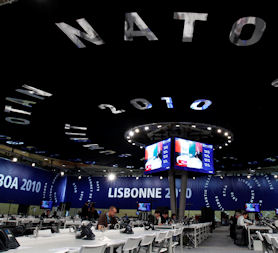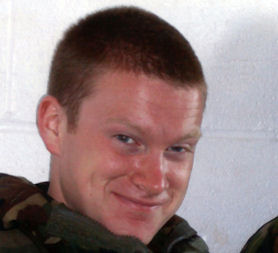Nato leaders expected to agree on missile defence shield
David Cameron is joining leaders at a Nato summit in Lisbon to discuss and sign an agreement to build a defensive shield in Europe against ballistic missile attacks.

The Prime Minister is attending the summit in Lisbon which is expected to see for the first time a political agreement on a missile defence system for European territory.
It will involve a commitment of US resources to the defence of Europe while also inserting a Nato command-and-control element into the system.
The first day of the summit will focus on matters like the defence system and Nato reform. Afghanistan will be high on the agenda too with pressure from aid groups for Nato commanders to abandon schemes to arm local militias and pay extra attention to abuses by the Afghan forces.
Despite Turkey raising last minute concerns about the missile defence system, British officials are confident an agreement will go ahead.
There is also expected to be some sort of cooperation with Moscow, as Russian President Dmitry Medvedev joining the summit tomorrow.
Russia has largely dropped its opposition to the defence system after Barack Obama announced he was abandoning plans by the Bush administration to site the interceptor in neighbouring Poland and Czech Republic.
The new plan is to have the main “hardware” carried on US warships stationed in the Mediterranean, although land based facilities have not been ruled out.
The missile system will be developed over the next decade and Britain will contribute the early warning radar station at Flyingdales and data processing centre at Menwith Hill. Both of these are part of the existing US missile defence system.
Whitehall has described the system as an “insurance policy” for the future, with more nations developing ballistic missile technology.
It is a firm indication of America’s commitment to European defence.
As part of Nato’s “strategic concept”, the European missile defence system is a key element which is expected to be adopted by the summit – it should guide policy for the next decade.
This includes commitment of new resources against cyber attacks and reform of Nato’s command-and-control structure. Personnel are also expected to be cut from 13,000 to 9,000.

100th British soldier killed this yearNato's summit begins on the day the 100th British soldier to die in Afghanistan has been named today as Guardsman Christopher Davies of 1st Battalion Irish Guards.
The 22-year-old from St Helens joined the Irish Guards in January last year. He was killed on 17 November while taking part in a security patrol in Nahr-e-Saraj in the north of Helmand Province.
He was hit by small arms fire to the east of patrol base Hazrat while on a joint operation with the Afghan National Army. His brother, John Davies serves in the same battalion.
His family issued a statement saying: "He was a loving son to Catherine and Gary; stepson to Nick; brother to Bernie, Matt and John; stepbrother to Mark, Emma and Jack; loving boyfriend to Emma; and father to Lucy.
"We are very proud of Christopher and all that he achieved. One of the last things that he told us was that he wanted to specialise within the Army - he was very focussed on his job and enjoyed the work, his comrades and the lifestyle.
"Christopher was a cracking lad. His friends in the Army have told us that whenever they felt down he would cheer them up, often by singing.
"We will always love Christopher. He had an invincible personality and we will miss him so much. There is a big hole in our lives."
Lieutenant Colonel Christopher Ghika, his Commanding Officer in 1st Battalion Irish Guards, said: "Guardsman Christopher Davies had been in the Micks for less than two years, but in a short space of time he forged a legendary reputation. Quiet and unassuming by nature, he had a deep military talent which shone out from his first day in the Battalion.
"He took time and care to be the perfect soldier: he was always punctual, well prepared, smart and thoughtful. As the tempo of our pre deployment training, and subsequent operations quickened, the strength of the man shone through.
"Uncomplaining no matter how challenging the circumstances; determined to surmount difficulty; focussed on doing his best and achieving his mission, but most of all he strove to be a comrade and loyal supporter to those in his platoon, company and battalion.
"If he was talented as a soldier, and he surely was, it was his decency and integrity which won him the admiration of all he came across. Courteous, genuine, caring and a friend to all, he was one of the characters on whom the bedrock of life in the Irish Guards is founded.
"We are all the poorer for the loss of this truly good and valued man, but we are immensely proud to have known and served with him. We send our condolences, thoughts and prayers to his parents, his brothers (one of whom is also serving in the Battalion), his sister, his girlfriend Emma and his daughter Lucy. Their loss is greater. Quis Separabit."
Afghanistan security
The summit leaders will discuss Afghanistan in more detail tomorrow, when they are joined by Afghan President Hamid Karzai and United Nations Secretary-General Ban Ki-Moon.
A framework for the transition of security responsibility to the Afghan authorities is expected to be agreed, with initial transfers of power beginning next year and the whole handover expected to conclude in 2014.
US Secretary of State Hillary Clinton said: “We believe as Nato allies the mission in Afghanistan is in the vital security interest of both of our people.
“We believe that it is important for us to listen closely to the government and the people of Afghanistan and about their concerns and try to address them. We also believe that our mission in Afghanistan is making progress which President Karzai has publically acknowledged and that we will agree tomorrow on the beginning of a transition to Afghan security, starting next year, with the intention and the goal of turning over Afghan security to the government and people of Afghanistan in 2014.”
Karzai provoked anger recently when he demanded a reduction in international forces and their military operations and he wanted them to stop night raids against suspected Taliban leaders – this is seen as one of Nato’s most successful tactics.
Mark Sedwill, Nato’s civilian representative in Afghanistan said the comments were “not helpful”.
He said: “We have different perspectives. That’s natural. It is much better if we work those different perspectives out in private.”
The coalition mission in Afghanistan is back on track according to Nato Secretary-General Anders Fogh Rasmussen. He says he is “very optimistic” for the future.
He said: “I think that, seen retrospectively, we under-estimated the challenge and our operation in Afghanistan didn’t have sufficient resources, and yes, that was a mistake.
“We’re on the right track now and that’s why I’m very optimistic about our Afghanistan operation and we’ll make a positive announcement in Lisbon – that the handover is about to begin.”